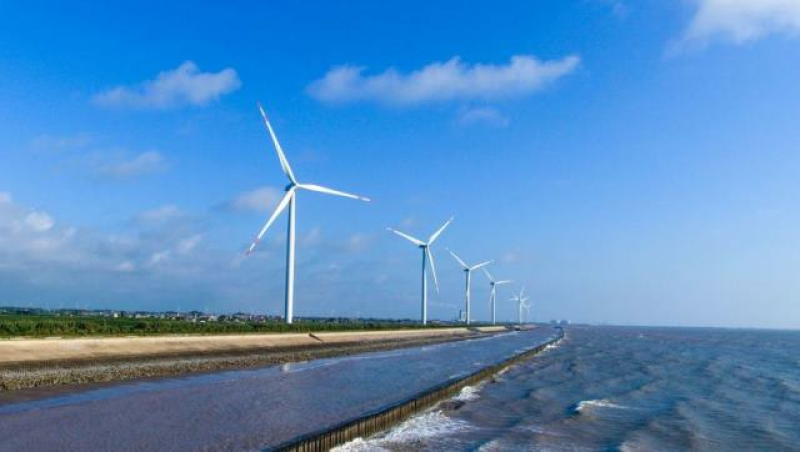- Death toll from central Israel strike rises to 5 |
- DSE sinks 138 points on broad sell-off; CSE also tumbles |
- Inside story of a roommate murder after quarrel in Dhaka |
- Jamaat condemns Khamenei’s killing, holds protest rally in Dhaka |
- Iran to pick next supreme leader in ‘one or two days’ |
Renewable energy is changing the landscape

Wind turbines line the coastal highway in Yancheng, China. © Yan Wang
18 April 2024 - Renewable energy, if supported by governments, can “truly change the landscape” in terms of achieving equitable access to affordable and clean energy, but only if they can move from “commitment to action”, according to the Director-General of the International Renewable Energy Agency (IRENA).
Renewable energy is generally defined as any energy source that is continuously replenished. It includes solar and wind power as well as bioenergy (organic matter burned as fuel) and hydroelectric power.
IRENA* chief Francesco La Camera spoke to UN News ahead of a special meeting on Friday on transitioning to sustainable sources of energy which is taking place at the UN Headquarters in New York as part of the first ever Sustainability Week.
Ensuring access to affordable reliable, sustainable and modern energy for all people, wherever they are in the world, is the aim of Sustainable Development Goal 7 (SDG 7).
UN News: What challenges have you faced when trying to persuade governments, international organisations and other stakeholders to embrace renewable energy?
Francesco La Camera: There are no difficulties in persuading governments to adopt renewable energy, but from the commitments to the action, there is always something lagging.
What is important in relation to the countries, with our members, is to support them in finding the right way to translate commitment into action. I think this is the challenge we have to face: how we can move to tripling renewable installation capacity by 2030? Now what is at stake is how we can really achieve this goal.
UN News: Are there notable differences in approaches, commitments and reactions between developing and developed countries when it comes to the energy transition?
Francesco La Camera: The developed world has to change the system. But, the developing countries can leap forward and transition directly to a new energy system as there is a lack of real energy systems. The main difference lies in the status of the energy system in these different parts of world, which is reflected largely in the existing inequality.
The other aspect is that the developed countries may have the tools, instruments and financial resources to drive the changes.
The developing world needs support in many aspects. Countries require financial and technological support to exchange experiences and technology. These are barriers that need to be overcome today to speed up the transition, especially in Africa.
In this respect, Africa is probably the most important powerhouse in the world for renewable energy and green hydrogen [a clean and renewable energy carrier]. But, Africa lacks the infrastructure to make this potential beneficial to its people, which would also benefit the world. Infrastructure such as ports, pipelines and civil infrastructure are decisive and crucial.
UN News: Could you give us an example of a site visit where you witnessed the critical role of renewable energy in achieving SDG 7 by 2030?
Francesco La Camera: One example that impressed me was Mauritius, where our support for solar panel installation in private houses, private buildings and public buildings has been truly transforming the landscape, giving a big push for achieving SDG 7.
UN News: Do you think the examples you mentioned can be replicated elsewhere in the world?
Francesco La Camera: To speed up the transition, we need to overcome some structural barriers that exist today. Infrastructure is the first barrier to overcome. Without efficient electricity and without providing storage interconnectivity, flexibility and balancing the grids, we cannot progress. Modernising and building infrastructure where it is absent is the top priority.
There are also the problems linking to the existing legal framework. The market is still designed in a way that does not favour the deployment of renewables. There are still a lot of subsidies for fossil fuel projects which I think should be tackled immediately.
Additionally, power purchase agreements are designed in a way that discourages renewable energy development. Market pricing mechanisms often do not support renewables because renewables need long-term contracts for stability and security in the electricity provided and the cost to be paid.
Finally, we need skilled professionals and a skillful workforce to be deployed on the ground.
We have to overcome these three barriers if we truly want the energy system to accelerate the transition from fossil fuels, as called for at COP28 in Dubai a few months ago.
UN News: How can normal citizens contribute to the renewable energy transition?
Francesco La Camera: We are striving to be more efficient in all our choices, but what is more important is the legal environment where everyone feels compelled to take action. We cannot only call for the moral imperatives. Society also makes an easier and simpler environment for people to make the right choices in terms of efficiency and energy conservation.
This interview has been edited for length and clarity.
* IRENA is an intergovernmental agency aiming to support countries in their transition to a sustainable energy future. Earlier this year on 26 January, the UN observed the first International Day of Clean Energy, which coincides IRENA’s founding anniversary. – UN News

